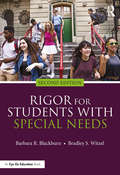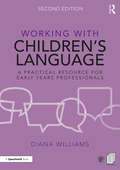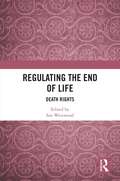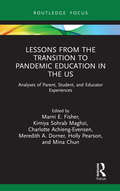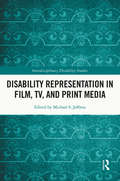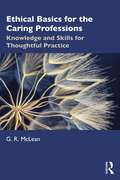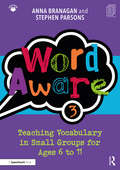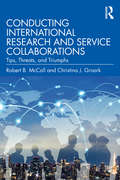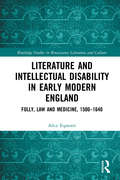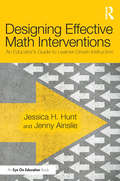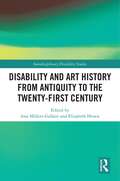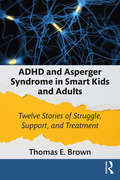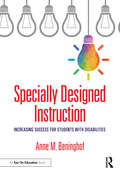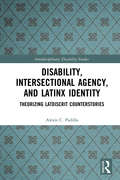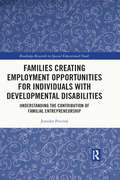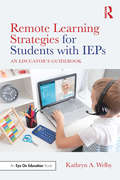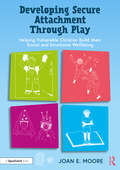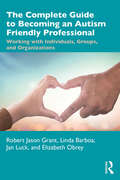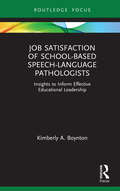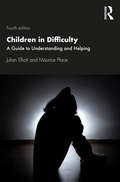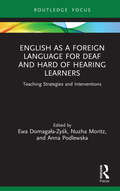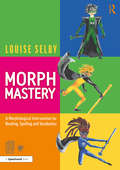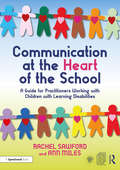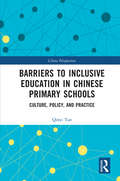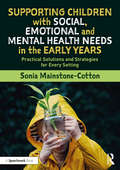- Table View
- List View
Rigor for Students with Special Needs
by Bradley S. Witzel Barbara R. BlackburnThis practical guide explains how to raise the rigor for students with special needs so they can achieve higher levels of learning. Bestselling author Barbara R. Blackburn and intervention expert Bradley S. Witzel provide helpful information on assessment, planning, co-teaching models, high expectations, common obstacles, and emphasizing positive outcomes. This second edition offers new, expanded instructional strategies for literacy and math, as well as strategies that work across subject areas. In addition, each chapter is filled with tools and examples to help you implement the ideas. Perfect for general and special educators and supervisors, the book also comes with a study guide so you can collaborate on the book with building or district colleagues. With the practical information in this book, you’ll understand how to teach with higher expectations and rigor so that all students can feel successful.
Working with Children’s Language: A Practical Resource for Early Years Professionals (Working With)
by Diana WilliamsThis revised and updated second edition of Working with Children’s Language has been created to support practitioners who work with young children with delayed language acquisition. Rooted in a developmental theory of language learning, it covers topics such as attention control and listening, the role of play, verbal comprehension and the acquisition of spoken expressive language. Each chapter offers a straightforward overview of current research relating to the specific language skill before introducing a wealth of targeted games and activities that can help support the development of those skills. Key features include: • A structured approach to language learning that can be followed as a programme or adapted for informal use by individual practitioners. • Accessible activities, games and ideas suitable for small group or individual intervention, linked to specific aims based on developmental norms. • Photocopiable and downloadable resources, including a record sheet to track progress in each skill against aims and outcomes for individual children. Clearly linking theory and practice in an engaging and easy-to-follow format, this is an invaluable resource to support children in early years settings and Key Stage 1 whose language is delayed, but who are otherwise developing normally. It is a must-have book for early years practitioners, teachers, SEND professionals and speech and language therapists with varying levels of experience.
Regulating the End of Life: Death Rights
by Sue WestwoodDeath Rights is a collection of cutting-edge chapters on assisted dying and euthanasia, written by leading authors in the field. Providing an overview of current regulation on assisted dying and euthanasia, both in the UK and internationally, this book also addresses the associated debates on ethical, moral and rights issues. It considers whether, just as there is a right to life, there should also be a right to death, especially in the context of unbearable human suffering. The unintended consequences of prohibitions on assisted dying and euthanasia are explored, and the argument put forward that knowing one can choose when and how one dies can be life-extending, rather than life-limiting. Key critiques from feminist and disability studies are addressed. The overarching theme of the collection is that death is an embodied right which we should be entitled to exercise, with appropriate safeguards, as and when we choose. Making a novel contribution to the debate on assisted dying, this interdisciplinary book will appeal to those with relevant interests in law, socio-legal studies, applied ethics, medical ethics, politics, philosophy, and sociology.
Lessons from the Transition to Pandemic Education in the US: Analyses of Parent, Student, and Educator Experiences (Routledge Research in Education)
by Marni E. Fisher; Kimiya Sohrab Maghzi; Charlotte Achieng-Evensen; Meredith A. Dorner; Holly Pearson; Mina ChunThis volume narrates and shares the often-unheard voices of students, parents, and educators during the COVID-19 pandemic. Through close analysis of their lived experiences, the book identifies key patterns, pitfalls, and lessons learnt from pandemic education. Drawing on contributions from all levels of the US education system, the book situates these myriad voices and perspectives within a prismatic theory framework in order to recognise how these views and experiences interconnect. Detailed narrative and phenomenological analysis also call attention to patterns of inequality, reduced social and emotional well-being, pressures on parents, and the role of communication, flexibility, and teacher-led innovation. Chapters are interchanged with interludes that showcase a lyrical and authentic approach to understanding the multiplicity of experience in the text. Providing a valuable contribution to the contemporary field of pandemic education research, this volume will be of interest to researchers, academics, and educators with an interest in the sociology of education, online teaching and eLearning, and those involved with the digitalization of education at all levels. Those more broadly interested in educational research methods and the effects of home-schooling will also benefit.
Disability Representation in Film, TV, and Print Media (Interdisciplinary Disability Studies)
by Michael S. JeffressUsing sources from a wide variety of print and digital media, this book discusses the need for ample and healthy portrayals of disability and neurodiversity in the media, as the primary way that most people learn about conditions. It contains 13 newly written chapters drawing on representations of disability in popular culture from film, television, and print media in both the Global North and the Global South, including the United States, Canada, India, and Kenya. Although disability is often framed using a limited range of stereotypical tropes such as victims, supercrips, or suffering patients, this book shows how disability and neurodiversity are making their way into more mainstream media productions and publications with movies, television shows, and books featuring prominent and even lead characters with disabilities or neurodiversity. Disability Representation in Film, TV, and Print Media will be of interest to all scholars and students of disability studies, cultural studies, film studies, gender studies, and sociology more broadly.
Ethical Basics for the Caring Professions: Knowledge and Skills for Thoughtful Practice
by G. R. McLeanThis book trains students of the caring professions, across health and social care, in the basic philosophical skills and knowledge needed to deal with the ethical aspects of their profession. It shows why ethical education is required, and teaches the skills of reasoning that equip professionals to think critically about the theories and arguments used in ethical discussions. It demonstrates how we can be confident that we can rely on common moral ground; but it also points out how we need to recognise the influence of different world-views, and to note how, on some issues, these can lead us in starkly different directions. It explains relevant philosophical theories, and evaluates their strengths and weaknesses – particularly in relation to what is required for proper professional ethics. It shows how to employ the commonly accepted framework of four ethical principles – beneficence, non-maleficence, autonomy, and justice. These various matters are then illustrated in two extended case studies, which focus on the problem of euthanasia, and the question of screening for disability and the value of human life. Ethical Basics for the Caring Professions is designed for use on all health and social care and human services courses on ethics and values. It will also be of interest to academics and professionals working within these fields.
Word Aware 3: Teaching Vocabulary in Small Groups for Ages 6 to 11
by Stephen Parsons Anna BranaganWord Aware 3 is a comprehensive, practical and engaging resource that focuses on teaching vocabulary and word learning skills to children aged 6 to 11 years who have vocabulary learning needs. For many children, particularly those with Special Educational Needs and Disabilities (SEND) or those whose home language isn’t English (ELL or EAL learners), the vocabulary of the classroom can be a barrier to learning. This book outlines how to best support these children who require extra help, offering concrete, easy-to-implement activities and resources for use in small groups, to maximise the impact on learning and open up access to the curriculum. Word Aware 3: Takes a highly practical, evidence-based and curriculum-focused approach to vocabulary learning that supports a broad range of learners Includes photocopiable and downloadable planning, intervention and evaluation resources Provides staff training resources and an overview video presented by the authors This book can be used as an adjunct to Word Aware 1, or as an intervention on its own. Although it is most suited to children aged 6 to 11 years, it may be adapted for older students with significant learning needs. It is an essential resource for teaching assistants and learning support assistants and will also save time for special educational needs co-ordinators (SENCOs) and speech and language therapists (SaLTs) who are keen to establish effective vocabulary interventions.
Conducting International Research and Service Collaborations: Tips, Threats, and Triumphs
by Robert B. McCall Christina J. GroarkConducting International Research and Service Collaborations: Tips, Threats, and Triumphs provides academic researchers, as well as non-profit and private professionals, with much-needed guidance on how to plan, implement, and manage international research and intervention projects. Accessibly written and illustrated throughout with examples and case studies of projects from Robert B. McCall and Christina J. Groark's wide-ranging and decades-long experience of cross-border collaborations, this book outlines how to prepare for and ensure success of cross-border research projects and interventions, how to embrace unique circumstances you may encounter, and what to do if things go wrong. Each chapter covers a general domain of concerns, advice, and lessons learned in conducting international collaborative projects followed by concrete illustrations that pertain to them. Key topics covered include launching projects and working with stakeholders, travelling and living abroad, cultural considerations, planning and funding, administrative issues, dealing with crises, and successfully implementing and disseminating findings effectively. This comprehensive guide is ideal for researchers and project managers – from large, global organizations to small NGOs, human services, private industry, and other fields embarking on such projects, as well as university students and academics.
Literature and Intellectual Disability in Early Modern England: Folly, Law and Medicine, 1500-1640 (Routledge Studies in Renaissance Literature and Culture)
by Alice EquestriFools and clowns were widely popular characters employed in early modern drama, prose texts and poems mainly as laughter makers, or also as ludicrous metaphorical embodiments of human failures. Literature and Intellectual Disability in Early Modern England: Folly, Law and Medicine, 1500–1640 pays full attention to the intellectual difference of fools, rather than just their performativity: what does their total, partial, or even pretended ‘irrationality’ entail in terms of non-standard psychology or behaviour, and others’ perception of them? Is it possible to offer a close contextualised examination of the meaning of folly in literature as a disability? And how did real people having intellectual disabilities in the Renaissance period influence the representation and subjectivity of literary fools? Alice Equestri answers these and other questions by investigating the wide range of significant connections between the characters and Renaissance legal and medical knowledge as presented in legal records, dictionaries, handbooks, and texts of medicine, natural philosophy, and physiognomy. Furthermore, by bringing early modern folly in closer dialogue with the burgeoning fields of disability studies and disability theory, this study considers multiple sides of the argument in the historical disability experience: intellectual disability as a variation in the person and as a difference which both society and the individual construct or respond to. Early modern literary fools’ characterisation then emerges as stemming from either a realistic or also from a symbolical or rhetorical representation of intellectual disability.
Designing Effective Math Interventions: An Educator's Guide to Learner-Driven Instruction
by Jessica H. Hunt Jenny AinslieDesign effective, learner-driven math interventions with this accessible and thought-provoking guidebook. Learn how to set up instruction to promote participation and understanding, plan purposeful, targeted tasks, develop student thinking, and create tools to assess student work in a way that measures learning, not just performance. Chapters explore questions that educators frequently struggle with when designing interventions, offering user-friendly research and evidence-based strategies to help overcome common hurdles. This book is essential reading for anyone seeking an adaptive approach to Tier 2 and 3 interventions that positions struggling students as competent learners.
Disability and Art History from Antiquity to the Twenty-First Century (Interdisciplinary Disability Studies)
by Ann Millett-GallantThis volume analyzes representations of disability in art from antiquity to the twenty-first century, incorporating disability studies scholarship and art historical research and methodology. This book brings these two strands together to provide a comprehensive overview of the intersections between these two disciplines. Divided into four parts: Ancient History through the 17th Century: Gods, Dwarfs, and Warriors 17th-Century Spain to the American Civil War: Misfits, Wounded Bodies, and Medical Specimens Modernism, Metaphor and Corporeality Contemporary Art: Crips, Care, and Portraiture and comprised of 16 chapters focusing on Greek sculpture, ancient Chinese art, Early Italian Renaissance art, the Spanish Golden Age, nineteenth century art in France (Manet, Toulouse-Lautrec) and the US, and contemporary works, it contextualizes understandings of disability historically, as well as in terms of medicine, literature, and visual culture. This book is required reading for scholars and students of disability studies, art history, sociology, medical humanities and media arts.
ADHD and Asperger Syndrome in Smart Kids and Adults: Twelve Stories of Struggle, Support, and Treatment
by Thomas E. BrownADHD and Asperger Syndrome in Smart Kids and Adults offers detailed examples of individuals who have above-average cognitive intelligence, but struggle with executive function impairments of ADHD and significant social-emotional impairments of Asperger syndrome. The book centers around twelve case studies of bright children, teens, and adults treated for both ADHD and Asperger syndrome. Each chapter describes diverse examples of their strengths and their difficulties and explains how these individuals can be helped with appropriate treatment to overcome their ADHD impairments and to improve their ability to understand and interact more effectively with others. Case examples are followed by updated, science-based descriptions of these disorders. Providing science-based information about ADHD and Asperger syndrome in clearly understandable, accessible language, this text is ideal for clinicians, educators, social workers, medical and mental health service providers, and parents of those struggling with such impairments. It also advocates for restoring the diagnosis of Asperger Syndrome to diagnostic manuals of the American Psychiatric Association and World Health Organization.
Specially Designed Instruction: Increasing Success for Students with Disabilities
by Anne M. BeninghofIn engaging, accessible chapters, expert teacher and author Anne M. Beninghof lays out a road map for providing specially designed instruction in any classroom. This book equips you with the answers to the most frequently asked questions around incorporating special education services into the general classroom – What is SDI? Who is responsible? How do we make it happen? Focused on creating an effective planning process that you and your team can follow to develop specially designed instruction, this toolkit includes dozens of practical examples, worksheets, and prep tools to ensure readers walk away with a thorough understanding and ready-to-use ideas. Whether you have years of experience working with students with disabilities or are new to the profession, this critical guide provides effective strategies for every classroom.
Disability, Intersectional Agency, and Latinx Identity: Theorizing LatDisCrit Counterstories (Interdisciplinary Disability Studies)
by Alexis PadillaThis interdisciplinary volume links dis/ability and agency by exploring LatDisCrit’s theory and activist emancipatory practice. It uses the author’s experiential and analytical views as a blind brown Latinx engaged scholar and activist from the global south living and struggling in the highly racialized global north context of the United States. LatDisCrit integrates critically LatCrit and DisCrit which look at the interplay of race/ethnicity, diasporic cultures, historical sociopolitics and disability within multiple Latinx identities in mostly global north contexts, while incorporating global south epistemologies. Using intersectional analysis of key concepts through critical counterstories, following critical race theory methodological traditions, and engaging possible decoloniality treatments of material precarity and agency, this book emphasizes intersectionality’s complex underpinnings within and beyond Latinidades. Through a careful interplay of dis/ability identity and dis/ability rights/empowerment, the volume opens avenues for intersectional solidarity and spaces for radical transformational learning. This book will be of interest to all scholars and students working in disability studies; intersectional disability justice activists; critical Latinx/Chicanx studies; critical geographies; intersectional political philosophy; and political and public sociology.
Families Creating Employment Opportunities for Individuals with Developmental Disabilities: Understanding the Contribution of Familial Entrepreneurship (Routledge Research in Special Educational Needs)
by Jennifer PercivalThis volume provides an in-depth, qualitative exploration of familial entrepreneurship as an innovative employment model, being established by families in response to difficulties faced by individuals with developmental disabilities in entering the labor market. Drawing on rich qualitative data collected via research with families, this volume explores how and why familial entrepreneurs in the United States have chosen to develop businesses to employ their loved ones. Chapters offer close analysis of the challenges and opportunities associated with familial entrepreneurship and highlight the ways in which this practice supports people with developmental disabilities by providing opportunities for skill development, social interaction, and participation in meaningful activity. Recognizing familial entrepreneurship as a new and distinct hybrid employment model, the text goes on to consider how curricula, policy, and state services might better support families and underpin this form of inclusive work. The volume provides important conclusions that contribute to the fields of Disability Studies, Entrepreneurship, Inclusive Education, Adult Education, Exceptional Student Education, Transition, and Vocational Rehabilitation. It is a key reading for scholars in these fields and across Education more widely.
Remote Learning Strategies for Students with IEPs: An Educator's Guidebook
by Kathryn A WelbyThis succinct guidebook provides educators with the essentials they need to navigate remote learning for students with Individualized Education Programs (IEPs). Filled with practical tools and excerpts from teachers in the field, this book explores tips to share with parents, alongside synchronous and asynchronous strategies that can help make IEPs possible in a remote environment. Ideal for special educators, coaches, service providers, and leaders, this is the go-to resource for supporting IEPs outside the traditional classroom.
Developing Secure Attachment Through Play: Helping Vulnerable Children Build their Social and Emotional Wellbeing
by Joan E. MooreDeveloping Secure Attachment Through Play offers a range of imaginative and engaging play-based activities, designed to help vulnerable young children forge safe attachments with their caregivers. The book focuses on key developmental stages that may have been missed due to challenging life circumstances, such as social-emotional development, object permanence and physical and sensory development. It also considers pertinent issues including trauma, separation, loss and transition. Chapters explore each topic from a theoretical perspective, before offering case studies that illustrate the theory in practice, and a range of activities to demonstrate the effectiveness of play in developing healthy attachments. Key features of this book include: • 80 activities that can be carried out at home or in educational settings, designed to facilitate attachment and enhance social-emotional development; • case vignettes exploring creative activities such as mirroring, construction play, physical play, baby doll play and messy play; • scripts and strategies to create a safe and respectful environment for vulnerable children; • photocopiable and downloadable resources, including early learning goals, a collection of therapeutic stories and a transition calendar By engaging children in these activities, parents, caregivers and practitioners can help the children in their care gain a sense of belonging and develop their self-esteem. This will be a valuable resource for early years practitioners, adoptive, foster and kinship parents, and therapists and social workers supporting young children.
The Complete Guide to Becoming an Autism Friendly Professional: Working with Individuals, Groups, and Organizations
by Robert Jason Grant Linda Barboa Jan Luck Elizabeth ObreyBased on the award-winning Autism Friendly Training Program, created by the non-profit organization STARS for Autism, this book empowers the everyday professional to a better understanding and skill in working with, interacting with, serving, and teaching children and adults who have autism spectrum disorder (ASD). After a thorough explanation of ASD and how it affects children, adults, families, and communities, this guide describes the Autism Friendly Training Program and gives the reader insight into what it means to become autism friendly and to be an autism friendly training presenter. This text will enable those who are neurotypical to gain insight into the person, the stories, and the lives of those with ASD. It is a guide to understanding autism at a deeper level to enable relationship and support processes that define being autism friendly. Providing the needed information, tools, and confidence to be autism friendly, this book will be beneficial to any and all businesses, organizations, groups, communities, families, and individuals who work with, serve, interact with, teach, parent, and experience life with an autistic person.
Job Satisfaction of School-Based Speech-Language Pathologists: Insights to Inform Effective Educational Leadership (Routledge Research in Special Educational Needs)
by Kimberly A. BoyntonThis text responds to the growing need for speech-language pathologists in school settings by asking how factors including people, work, pay, opportunities for promotion, and supervision impact the overall job satisfaction of school-based speech-language pathologists. Drawing on data from a quantitative study conducted in schools in the US, the text foregrounds the experiences and perspectives of speech-language pathologists working in the public school sector, and illustrates the critical role of effective and supportive educational leadership and administration in ensuring effective recruitment, retention, and job satisfaction amongst these much needed professionals. The text highlights growing responsibilities of speech-language pathologists in schools and considers recruitment and challenges in the sector can be remedied by greater understanding of how job satisfaction relates to speech-language pathologists’ experiences and perspectives on pay, work, opportunities for promotion, and support from a supervisor. This short text is aimed at researchers, scholars, and administrators in meeting the growing needs of children and students with speech and language difficulties in Early Childhood, Elementary, and Secondary education settings . The text will be particularly valuable for school leaders looking to support speech-language pathologists in their setting.
Children in Difficulty: A Guide to Understanding and Helping
by Julian Elliott Maurice PlaceThis fully updated fourth edition of Children in Difficulty explores some of the most common, yet incapacitating, difficulties often encountered by young children and adolescents. Drawing on the latest research and with case studies throughout, chapters cover topics such as challenging behaviour and school refusal, eating disorders, anxiety and depression, substance misuse, neurodevelopmental disorders, dyslexia and dyspraxia. The book provides a deeper understanding of each difficulty, considering the complexities of each problem at depth and analysing the best forms of intervention. It includes insights from the fields of genetics and neuroscience, and ensures that claims for the effectiveness of specific interventions are supported by rigorous scientific evidence. Features of this new edition include: Up-to-date insights from the fields of psychology, genetics and neuroscience Recognition of the increasing impact of social media and the internet on children and young people. Written by experts in the field, this book distils high level scientific and clinical knowledge in a way that is accessible to professionals from a range of child-care disciplines. It will be of significant value to those working in education, health or social care, and anyone who needs to be able to recognise and help children in difficulty.
English as a Foreign Language for Deaf and Hard of Hearing Learners: Teaching Strategies and Interventions (Routledge Research in Special Educational Needs)
by Ewa Domagała-Zyśk; Nuzha Moritz; Anna PodlewskaThis book outlines best practice and effective strategies for teaching English as a foreign language to D/deaf and hard of hearing (DHH) students. Written by a group of researchers and experienced practitioners, the book presents a combination of theory, hands-on experience, and insight from DHH students. The book brings together a variety of tried and tested teaching ideas primarily designed to be used for classroom work as a basis for standby lessons or to supplement courses. Placing considerable emphasis on practical strategies, it provides educators and practitioners with stimulating ideas that facilitate the emergence of fluency and communication skills. The chapters cover a wide range of interventions and strategies including early education teaching strategies, using sign -bilingualism in the classroom, enhancing oral communication, speech visualization, improving pronunciation, using films and cartoons, lip reading techniques, written support, and harnessing writing as a memory strategy. Full of practical guidance grounded in theory, the book will be a useful resource for English teachers and all those involved in the education of deaf and hard of hearing learners across the world; including researchers, student teachers, newly qualified teachers, school supervisors, and counsellors.
Morph Mastery: A Morphological Intervention for Reading, Spelling and Vocabulary
by Louise SelbyMorph Mastery is an accessible, practical guide designed to support learners with specific learning difficulties (SpLD) who are struggling with spelling, reading and vocabulary. It is an effective, research-based and fun solution for when phonics-based teaching has run its course. Understanding the morphological regularities in English helps to support both spelling and reading comprehension, yet there are few practical interventions that take a morphological approach. Morph Mastery combines this exciting new approach with tried-and-tested teaching methods that work. The activities in this book follow three engaging ninja-like characters, Prefa, Root and Sufa, who represent the three core components of morphology (prefixes, root words and suffixes) and use their sceptres to craft words. Key features include: • Exciting and engaging activities and games, designed to be used by individuals or small groups • Detailed, curriculum-linked assessments, enabling specific target setting • Photocopiable and downloadable activity sheets and resources Written in a user-friendly tone, for teaching assistants, teachers and other professionals with little or no specialist knowledge, this book is a must for any school with struggling readers and writers aged 9–13.
Communication at the Heart of the School: A Guide for Practitioners Working with Children with Learning Disabilities
by Ann Miles Rachel SawfordCommunication at the Heart of the School introduces a simple, practical approach for communication development in schools, with a specific focus on children with Severe Learning Difficulties (SLD) or Profound and Multiple Learning Difficulties (PMLD). The tried-and-tested framework offers a shared approach to communication development between teachers and speech and language therapists, moving through three crucial stages: the communication assessment, the communication pathway and the classroom environment. It provides a clear structure for the role of each professional and explains how they contribute to every aspect of the child’s communication development. Key features include: A communication pathway that follows a yearly cycle of assessment, plan and intervention, identifying specific communication needs and offering advice on creating communication-friendly environments A focus on the shared vision of teachers and speech and language therapists, creating a united and team-led approach to communication development, ensuring that both therapists and teachers feel supported in tackling complex communication challenges effectively Photocopiable and downloadable assessment forms for accurately measuring outcomes in a time-friendly and accessible way Underpinned by the Communication and Cognitive Framework currently used by teachers, speech and language therapists and families, this resource offers a complete package of communication support. It is an essential tool for speech and language therapists and teachers supporting children communicating at early developmental levels.
Barriers to Inclusive Education in Chinese Primary Schools: Culture, Policy, and Practice (China Perspectives)
by Qinyi TanIn response to the growing international interest in inclusive education, this book examines its practices and issues in the Chinese context through case studies of two regular primary schools in mainland China where children with special needs are admitted. The main concerns of this book not only involve the inclusion of children with disabilities, but also those with special educational needs but without physical and sensory difficulties, such as children from socially and economically disadvantaged groups, children from diverse cultural and linguistic groups, and children alienated in classrooms. This book discusses these issues and challenges against the background of the existing educational system and policy, and identifies the barriers to their inclusion in current school education, such as lack of in-service training for teachers, limited involvement of local communities, big class size, and corporal punishment, etc. Academics and postgraduate students in the field of inclusive education, social education, and Chinese studies will find this book useful, as well as policy makers, school teachers, and administrators.
Supporting Children with Social, Emotional and Mental Health Needs in the Early Years: Practical Solutions and Strategies for Every Setting
by Sonia Mainstone-CottonThis accessible book offers essential guidance and practical ideas for Early Years staff to support children with social, emotional and mental health (SEMH) needs. It draws upon a wealth of experiences and insights to explore what SEMH is, why children may have SEMH needs, and what this can look like, giving practitioners the confidence they need to understand early signals and signs. Chapters share practical tools, activities and strategies, exploring topics that include: environment routines and transitions sensory experiences feelings and emotions the role of the adult. A range of case studies and resource suggestions are woven throughout, bringing the theory alive with first-hand advice from a variety of professionals, including educational psychologists, play therapists and Forest School specialists. This book is a refreshing and practical guide, and an essential read for all Early Years practitioners looking to cultivate a supportive and compassionate environment.
